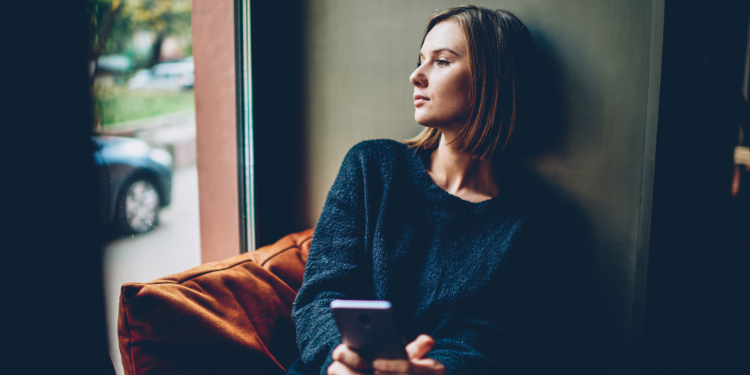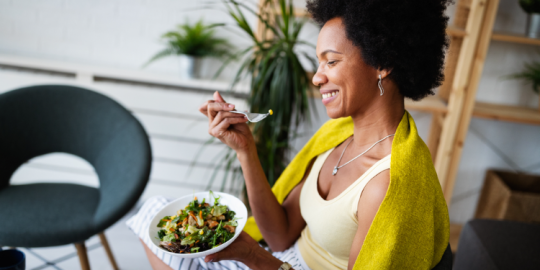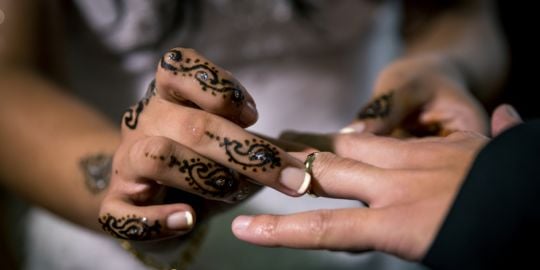The testimony of this young expat the Netherlands is heartbreaking. “I was recently diagnosed with cancer and had to undergo a surgery. I was counting on having my mother by my side in these hard times, but she wasn't allowed to come, ”says Jenny. Since the United Kingdom is no longer part of the EU, her British mom cannot travel to the Netherlands except for essential reasons. "I was told that she could only visit me if she was a professional caregiver or if I was over 75 and was terminally ill." Fortunately, Jenny was able to find a support network. But she admits that things would have been be so much easier for her with her mom's support. “I really don't understand the current regulations. How can they allow people who have only known each other for three months to meet, but not families?".
Jenny isn't the only expat to condemn this! Anita, an Ecuadorian who has lived in the Netherlands for almost six years with her Dutch husband, tells us her side of the story. “'I'm an only child, and my parents are divorced, so my mom lives alone in Ecuador. We have been trying to bring her since last year around August. We have changed several times her flights due to the entry ban”. Anita gave birth to a baby girl last week and was really hoping that her mother would be there. “This whole situation of being alone at home with all Corona restrictions and not being able to come to see me has caused a severe depression on my mom. She is in psychological treatment now because she has developed heavy claustrophobia”. Anita admits that it hasn't been easy for her to handle her pregnancy, knowing that her mom is not doing well. “She shouldn't be alone, but I cannot do anything. Also, having the birth of my child without her has been such a hard situation. She is missing the most important moments of my life due to these prohibitions”.
Christian, a South African expat, hasn't seen his daughter for more than a year. “She could not be included in our resident permit application as she is over 18, but we thought she would be able to visit us regularly since she has a Schengen visa”. Christian and his wife have missed not only their daughter's birthdays but also plenty of family events that they can only keep track of via social media and apps. He can't believe that his own daughter is considered a tourist in the Netherlands. "They could just have granted a special visa to our close family members", he says.
Currently, only citizens of certain third countries, such as Australia, New Zealand, Singapore, South Korea, Thailand, China, under strict conditions, etc., are allowed to travel to the EU. But with the new COVID-19 surges around the world, travel restrictions are constantly reviewed, making travel from third countries even harder. Even though there are a couple of exceptions in the Netherlands, grandparents, for example, are only allowed to travel if they are dependent on their family members in the country.
Katie, who gave birth to a baby girl last year, says she misses her parents dearly. "They could not make it due to the travel restrictions, and that was really painful even though we regularly speak via apps like Facetime." It has been 6 years since Katie moved to the Netherlands with her Dutch husband. Fortunately, she can count on her husband's family, who live just a few kilometres away. Still, she reckons that having her parents' support through all these steps would have been a different thing. She has also joined the movement for the lifting of travel restrictions for third-country family members. Erin, another expat, wonders why her parents are not allowed to visit her, although they have already been vaccinated against COVID-19.
A petition named “Family is not tourism” has already been signed by more than 14,000 expats in the Netherlands who have had enough of this endless pain. They also point out that EU law advocates equal treatment for EU citizens and their families coming from third countries. “Some of us have parents who are very ill. You can't even imagine how hard it is to be away from them in such times".
This campaign is quite similar to the #loveisnottourism campaign, launched last year as the global health crisis and border closures kept intercultural couples apart for many months. Fortunately, many of them were able to reunite following various efforts.
It's worth noting that the current situation is an issue for expats living in many countries and not only in the Netherlands. Davina is an expat in the United Kingdom and hasn't seen her parents for more than a year either. “My parents, who are Mauritians, usually visit us every year. The most difficult part for us all is that they couldn't be there where I delivered my second daughter. She is about to turn one, and so far, she has only seen her grandparents on Whatsapp. My husband's family is also quite far away, so we can't rely on them either”.
Andrea Morales, the founder of the campaign, shares her thoughts
“My first step in this campaign was a letter to the Kinderombudsvrouw because I wanted my mother to come to The Netherlands to celebrate together the second birthday of my daughter Emilia. In August 2020 the Ministry of Justice and Security of The Netherlands had implemented the first exception to the entry ban (for long-distance relationships), and I could hardly believe that the government was giving priority to long-distance relationships (with a duration of 3 months) above the relationship my daughters and I have with my mother. I felt both relationships needed to be treated equally: they are both grounded on the Right to Family Life.
It is important to mention that during the summer, people in The Netherlands were going on holidays, and EU citizens were also visiting The Netherlands for recreational purposes. Society, in general, was enjoying a lot of freedom. Particularly in our case, the birthday of my daughter Emilia was celebrated with my in-laws: 8 adults and 8 children. The only person from my own family I wanted that day besides me was my mother, and despite having a valid visa, she was not allowed to travel to NL. This gave me a feeling of being treated unfairly. My daughters have a very close relationship with my mother. If all kids in The Netherlands were free to spend time with their families, then my kids deserved exactly the same right to be with their family: even if their family members had a nationality from outside the EU. They could hardly understand why their friends were seeing their grandparents often (especially the ones living abroad within Europe) and they couldn't see their grandmother.
I decided to start a campaign on behalf of their Right to Family life to show them it was wrong to treat children differently based on the nationality of their families. I wanted the same freedom of choice as every other Dutch citizen in this country to be able to decide for myself when I could see my mother. I sent another letter to the Kinderombudsvrouw and the Ministry of Justice. I felt I was not heard and that they were not taking me seriously. It was hard to imagine that in such a country as The Netherlands, a violation of children's rights was taking place and that authorities were just looking the other way around. I knew I was not the only one missing my family. I was certain that there were other Dutch children who wanted to see their grandparents as well. I decided to use Instagram to reach out to other families in the same situation.
From 0 followers, I have now contact with more than 350 families in the same situation. With the day this community grows. The stories I have heard since the start of this campaign in November 2020 motivate me to continue. My heart breaks, and, at the same time, it beats faster when I hear how much pain this separation is causing to hundreds of families. I cannot tolerate the unfairness and inhuman way in which the Dutch government is treating us. I feel this campaign has given many people a voice to express their sadness, desperation, frustration, disappointment and disbelief. No one of us could imagine we would be forbidden from seeing our families for more than a year. In a country that praises itself for respecting human rights, to feel discriminated against due to the nationality of your family is hard to accept. My deepest hope is that soon we can all receive our loved ones here in The Netherlands. This would mean that we are finally treated equally, regardless of the nationality of our families.”
More testimonials
Fran, a British mom
“I have a son who is studying in Amsterdam. He is 17 and, therefore, a minor. I am concerned about his mental well-being due to the lockdown and would like to visit just to make sure he is ok. I am currently in the UK. We are unable to travel until May 17, but I am very much hoping I will be allowed into the Netherlands after that to visit my son. I realise this pandemic is a challenge on all fronts, but I think close families should be permitted to visit.”
Neha, an Indian expat
“I'm the only child to my parents. Though they are Indians, they have been working and living in Kuwait for more than 25 years. My father passed away last July after a Covid attack. Since then, my mother is alone in Kuwait. Due to all the travel restrictions, neither could I go to Kuwait or nor could she come to the Netherlands after my dad's passing away. I couldn't even say goodbye to my dad. All our attempts to bring my mother to the Netherlands after my dad's death failed. She is 73 years old and alone in a foreign land. Given her age, we didn't want her to go back to India while infections rates are still high there. We as a family, especially my mom, is in a complete emotionally drained state for the last nine months. As I'm the only child (and hence my kids are only her only grandchildren), not able to be with them in this difficult period is making her
life even tougher.”
Shalini, an Indian expat in the Netherlands
“I have been married to a Dutch native since 2001. I have resided in the Netherlands since 2005 and have Dutch citizenship. Our son was born in 2008 in the Netherlands. My mom is 77 years old, lives in Mumbai, India and has an Indian passport. She needs to get a visa every time she comes to see us. She saw us last in September 2019. We could not travel to see her in April / May 2020, and she couldn't come to us that summer either because the embassies are closed, and both countries went through lockdowns and waves of corona. My mother is a widow, and I am an only child. My son, who has classical autism, is very attached to his “ Nani “ and has not seen her in one year and seven months. We have not travelled to India since April 2019. I can bear not seeing the rest of my family and friends, but I cannot bear not seeing my mom for this long. My mother has had both her corona vaccinations and is prepared to do a PCR test and also to quarantine at our home after she arrives here in the Netherlands. She doesn't intend to live here permanently. She just misses us as we miss her.”
Anastasia, a Ukrainian expat
"My family is mostly located in Israel except for my father, who is in Ukraine. Whilst there is at least a way for me to see my father by going to Ukraine myself, it's just not possible for me to meet the Israeli side of my family because I'm not Israeli myself. Besides, my grandmother has cancer. I haven't seen her for more than a year already, and she dreams to come and visit me here while she still can. She has never been to the Netherlands before, and all I really want is to have a chance to show her the beauty of the Netherlands while she is still around. And I'm really afraid of a chance of our previous meeting to really become the last one for us. My mother, who is in Israel taking care of her, hasn't seen me for more than a year, and this, combined with many challenges that she has to deal with, is getting her more and more depressed. I really want to have a chance to support her in person and to finally see her.”
















